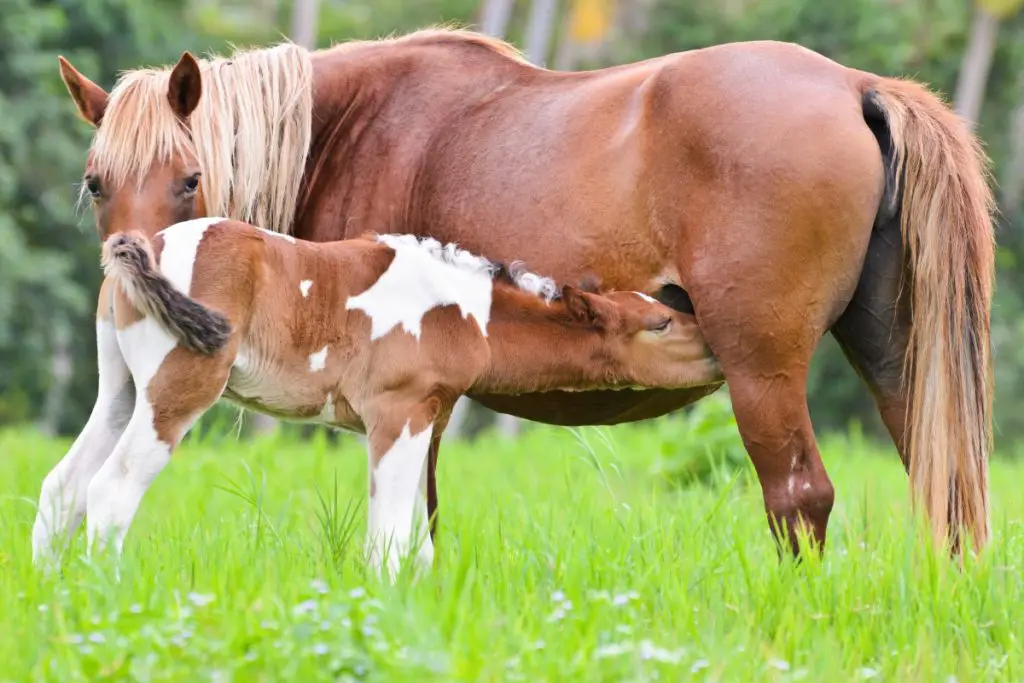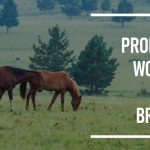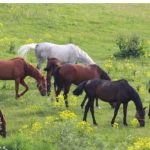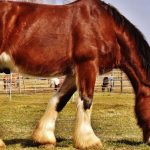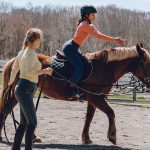How Old Can a Horse Be to Breed? A horse can begin breeding at around three years of age, but it is recommended to wait until they are four. Horses reach physical maturity between five and seven years old, so this is the ideal time for them to start breeding. At older ages a mare or stallion’s fertility may decline, making conception less likely.
In addition, the risk of complications during pregnancy increases with age, as does the likelihood of foal deformities or abnormalities due birth defects related to advanced maternal age. For these reasons it is generally better not to breed horses over fifteen years old unless special considerations exist such as excellent health and sound reproductive organs for both parents.
A horse’s breedability is determined by many different factors, one of which is age. Generally speaking, mares can be bred as early as 2 years old and stallions can start breeding at 3 years old. However, it is important to remember that a horse’s health should always come first when deciding whether or not to breed.
If the horse has any physical issues that could affect its fertility or increase risk for complications during pregnancy and labor, then the decision to breed should be made carefully with your veterinarian’s input.
When is a Horse Too Old to Breed
It is generally accepted that the best age for a mare to begin breeding is between four and eight years of age. After this point, fertility may start to decline as she ages and her reproductive system begins to shut down. The maximum breeding age for a horse is typically considered 15-20 years old, but it can vary greatly depending on the individual animal’s health and condition.
As horses get older, it becomes increasingly important that they receive regular veterinary checks before being bred in order to ensure good outcomes for both mother and offspring.
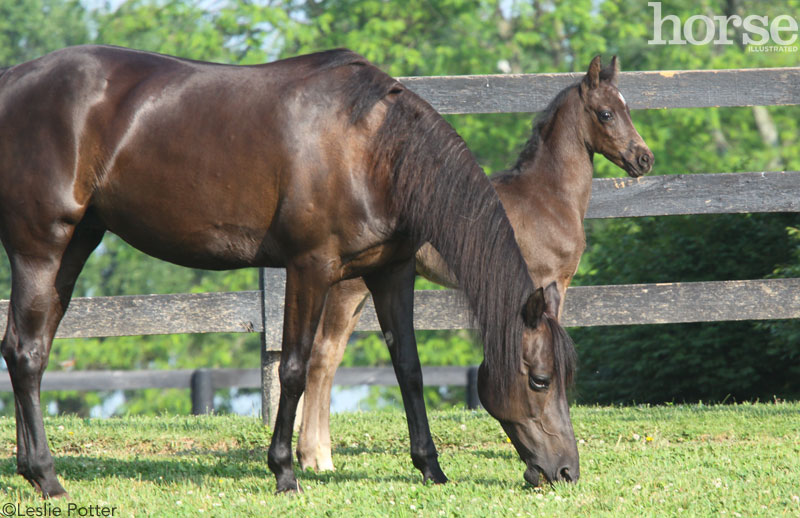
What is the Maximum Age to Breed a Horse?
The maximum age to breed a horse is dependent on the individual animal, its health and well-being, as well as other factors such as the mare’s reproductive history. Generally speaking, horses should be at least 5 years old before they are bred. Some breeds may require the mares to be of an older age before being used for breeding, with some peaking in fertility around 10-15 years old.
In addition to this, stallions can remain fertile until much later ages than mares; many stallions continue reproducing into their 20s or even 30s! It’s important that when deciding if a horse is ready for breeding you take into consideration it’s overall health and state of mind. Breeding young animals not only increases their risk of injury but also increases the chances of complications during pregnancy and birth – both for the mother and foal.
With this in mind, it is important to ensure any prospective breeding stock is healthy enough to carry out such a task safely.
Can You Breed a 1-Year-Old Horse?
No, you cannot breed a 1-year-old horse. Horses should not be bred until they are physically mature and able to carry the burden of pregnancy; this usually occurs when the mare is 4-5 years of age with some breeds maturing later than others. Breeding too early can cause complications for both the mare and foal that may have long-term implications such as an increased risk of injury due to rapid growth or poor skeletal structure development in the foal.
Additionally, even if a young stallion was able to impregnate a young mare successfully, it’s important to remember that both individuals need time to develop mentally before being ready for breeding responsibilities. For example, even at two years old they may still display immature behaviors which could lead them into dangerous situations when faced with a new experience like mating or handling their own offspring. Overall, while 1-year-old horses can technically reproduce given access to each other, it is highly discouraged due to potential health risks for both parties involved and the lack of mental maturity needed for successful reproduction.
Is 14 Too Old to Breed a Horse?
No, 14 is not too old to breed a horse. In fact, there are many advantages to breeding a horse at this age. For starters, an older mare may have more experience in birthing and raising foals than younger mares, making the process much smoother for both the mother and offspring.
Additionally, mature horses often possess established personalities and temperaments that can help determine which stallion would make the best match for successful mating. Furthermore, due to their advanced age, most experienced breeders will be able to recognize any potential problems or complications that could arise during pregnancy or labor with greater accuracy when working with older mares as opposed to younger ones. In conclusion, while it’s certainly possible to start breeding horses earlier in life (generally around four years of age), fourteen is far from being “too old” – especially given all the advantages associated with maturing animals!
At What Age is a Horse No Longer a Foal?
A foal is a young horse that has yet to reach maturity. Generally, foals are considered newborns under the age of one year old. During this time, they rely heavily on their mothers for nutrition and protection from predators in the wild or potential harm in captivity.
Foals go through rapid physical and mental development during their first year of life, learning important skills such as communication with other horses, grazing habits, and relationship-building with humans. While most foals gain enough strength by 6-8 months to be weaned from nursing off their mother’s milk, it takes another few months before they can fully stand on their own four feet without assistance. As such, a horse is no longer officially considered a foal once it reaches 12-15 months old; at this point, its growth rate begins to slow down significantly and its body starts transitioning into adulthood.
What are the Risks of Breeding Older Mares?
When it comes to breeding older mares, there are several risks that must be considered. As with any animal, the older they become, the more susceptible they are to health problems and complications. For example, an aged mare is at much higher risk of developing reproductive issues such as uterine infections or infertility due to a decrease in egg quality.
Additionally, she could suffer from hormonal imbalances which can make conception difficult or impossible. Age also increases the risk of foaling difficulty due to weakened muscles and ligaments around her uterus; if not managed correctly this could lead to serious injury for both mother and foal or even death. Other risks include increased chances of miscarriages or stillbirths if conditions aren’t ideal during gestation; an elderly mare may also take longer than normal for her body to recover post-foaling.
It is important then that breeders carefully consider these potential risks before deciding whether an aged mare should be bred or not – seeking professional advice from your vet can help ensure a safe outcome for all involved!
How Many Times a Year Can a Horse Breed?
The frequency with which a horse can breed will vary greatly from one animal to the next. Generally, horses reach sexual maturity between 18 months and three years of age depending on the breed. Most mares are capable of reproducing every 11 months but may take longer if they had a difficult foaling or have experienced any health problems.
Breeding season for most breeds runs from February through August, though some breeds prefer colder weather and will therefore start later in the year. While a mare is capable of being bred more than once per year, it is not recommended as overbreeding can put stress on her body and result in complications during gestation, delivery or lactation.
Deciding to breed a mare (Breeding Horses #1)
Conclusion
In conclusion, it is essential to consider the age of a horse before breeding. While there is no set limit on how old a horse can be before they are too old to breed, experts generally agree that mares should not start breeding until they are at least 4 years old and stallions should wait until 5 or 6 years of age. Additionally, horses over the age of 15-20 should not be bred as this could lead to health complications for both mother and foal.
It’s likely best to consult with your veterinarian about when the optimal time would be for your specific horse’s individual circumstances.
Janet G Kulick is an experienced horse rider, trainer, and owner of the informative horse blog, Horseray.com. Her engaging writing style and wealth of knowledge on horse care, riding, and training make her a trusted source for horse enthusiasts worldwide.

